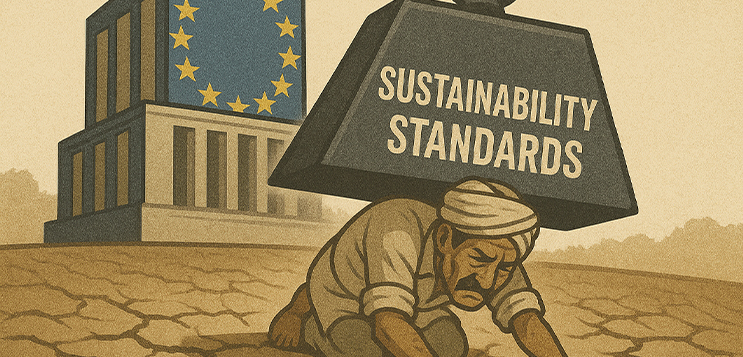
Europe has been bullish about its goal to become sustainable and achieve climate neutrality. First came the European Green Deal, a comprehensive roadmap for climate action, environmental protection, and social sustainability. It covered industries like energy, transportation, agriculture, and manufacturing.
Building on that came the European Climate Law, followed by a set of Environment, Social, and Governance (ESG) Regulations. These were meant to make sustainability real, through enforceable rules that would change how things are produced and consumed.
But now, those same regulations are losing their earlier intensity. After months of debate, the original ESG rules have been replaced by a new version, the Omnibus Regulation: “simplified” according to the EU, or “watered down” if you ask critics.
What Changes as Omnibus Regulation enters the Green Deal?
The original ESG rules had clear targets. They required companies to assess environmental risks, ensure human rights across supply chains, and report detailed sustainability data. But the Omnibus Regulation has softened many of these demands.
Key laws, like the Corporate Sustainability Reporting Directive (CSRD), EU Taxonomy, Sustainable Finance Disclosure Regulation (SFDR), EU Deforestation Regulation (EUDR), and Corporate Sustainability Due Diligence Directive (CSDDD) still exist, along with tools like, Carbon Border Adjustment Mechanism (CBAM) and Track & Trace. But their implementation looks very different now.
The CSRD scope has been narrowed to only large EU companies with over 1,000 employees. Reporting requirements have been reduced by over 70% to ease compliance burdens. Meanwhile, many small and mid-sized non-EU exporters, including those in India, have been excluded from direct obligations.
Less Pressure for Indian Exporters? Not Exactly.
At first glance, this may seem like a win for Indian businesses, fewer forms to fill, fewer audits, less red tape. But this is only part of the story.
India continues to be a critical supplier of raw materials and various products to large European companies across multiple sectors, including pharmaceuticals, automotive, renewable energy, tobacco, textiles, and food. These companies are still required to uphold EU sustainability goals—like preventing deforestation, reducing emissions, and enforcing ethical labour—throughout their supply chains.
So even if the law doesn’t directly cover Indian suppliers, they’re still expected to comply, because their European buyers are.
The Burden Shifts, But Doesn’t Disappear
The Omnibus changes who must report, but not what is expected. The sustainability standards remain intact. Large EU companies still need clean, traceable supply chains and that responsibility continues to cascade down to their suppliers, including small farmers in India.
This indirect pressure is even more difficult to navigate. Without clear rules or support, Indian suppliers are left guessing.
The Farmer Is Still Forgotten in the Green Deal
While Europe adjusted regulations to protect its own businesses, it offered no such flexibility to the millions of farmers at the other end of the global supply chain. In India, many smallholders operate informally, lack digital records, and are already grappling with soil degradation, erratic rainfall, and shrinking margins.
Sustainable alternatives to fertilisers and pesticides are expensive, and training programs to help farmers transition are either absent or insufficient. Some organic fertilisers and pesticides cost 2–3 times more than conventional chemical options, due to higher production costs, specialised handling requirements, and smaller-scale availability, making them inaccessible for most smallholders.
Technology-led solutions like geospatial apps, soil health sensors, etc., are often inaccessible to those who need them most. And introducing new practices without understanding local realities only widens the gap between policy and ground reality.
For farmers growing cotton, tobacco, tea, coffee, spices, and other key exports, these shifts threaten their already fragile income systems.
In fact, approximately 6 million Indian farmers depend on cotton cultivation, and about 9% of India’s raw cotton is exported to Europe. Over 50% of India’s FCV tobacco production also heads to foreign markets. Similarly, more than 13,000 gardens and around two million workers are involved in tea farming, coffee supports 3.66 lakh growers, and as the world’s largest spice producer, India has over 5.5 million people engaged in spice cultivation alone. Many across these sectors are part of India’s export pipeline to the EU.
Yet these communities are now expected to transform their farming practices under growing sustainability demands—even as around 30% of Indian farmers lack proper documentation, nearly 70% are yet to adopt agricultural technology, and most continue to receive little more than policy recitation in the name of government support.
Sustainability Cannot Be One-Sided
The Omnibus Regulation may ease the load for EU businesses, but for India’s rural producers, nothing has changed. Beyond farmers, these rules will also impact underprepared suppliers of pharmaceutical raw materials, automobile components, textiles, and several other key export sectors.
As the pressure to comply remains, and that too without clear guidance, training, or financial aid, this transition risks becoming exclusionary.
If the EU truly intends to lead a global green transition, it must invest in the systems that support that change, starting with training programs, transitional financing, and clear compliance toolkits for farmers and exporters in the Global South. The very businesses that successfully lobbied to “water down” the European Green Deal can—and should—play a role in handholding their suppliers through this transformation.
